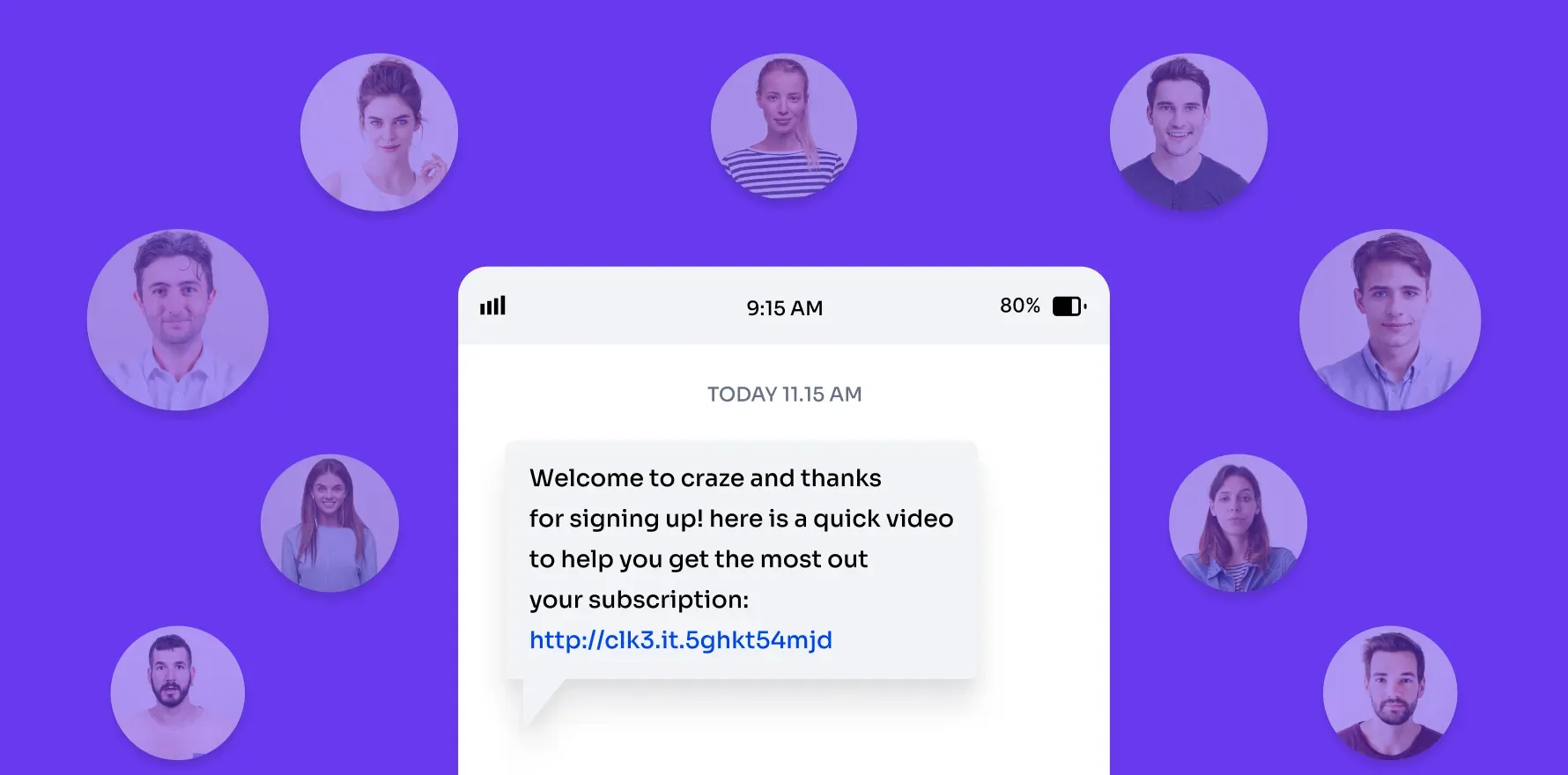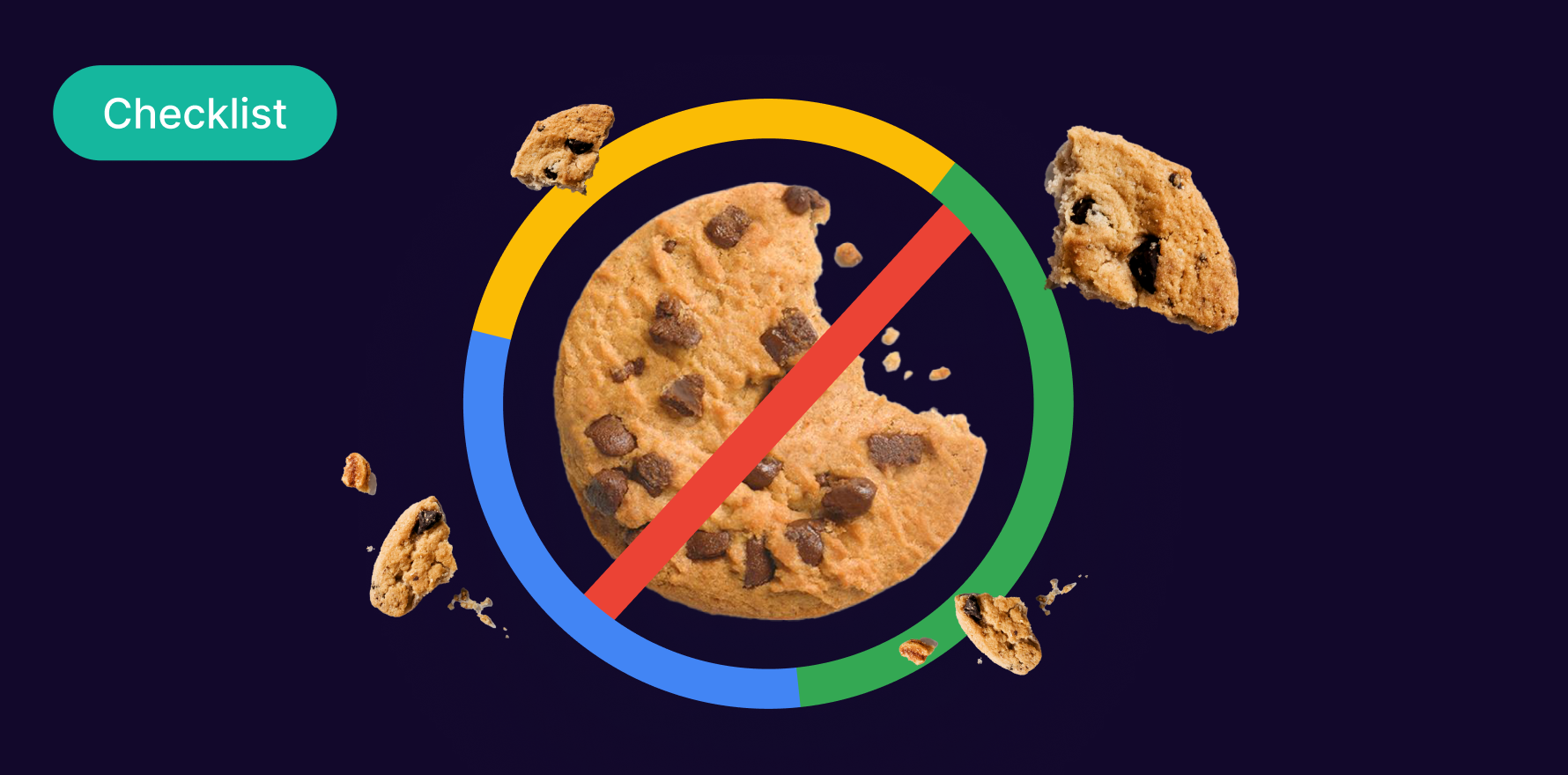A marketing channel with a 98% open rate and a 45% conversion rate sounds too good to be true. But with SMS marketing, these staggering results are indeed possible. As a result, several DTC brands are leveraging this marketing goldmine to up their conversions and sales.
For example, Princess Polly, a trendsetting apparel brand, got a 10x ROI from loyalty programs through SMS marketing. Another Shopify snack brand that opted for SMS marketing achieved 26.96x ROI and a 29% conversion rate.
While SMS marketing has significant ROI potential, the primary challenge for brands is to increase the number of SMS subscribers while ensuring regulatory compliance. The U.S., for example, has stringent regulations for SMS marketing and list building. Brands that don’t comply with the guidelines laid out by TCPA are levied fines of up to $10000. To prevent this, you need to employ transparent strategies to increase SMS marketing subscribers for your DTC brand. Your customers must know what they are signing up for, and you need to give them reasons to subscribe – that’s the long and short of it.
How to get more subscribers for SMS marketing?
With the ROI potential promising ROI figures of SMS marketing, monetizing your subscriber list in the context of CX and marketing is not just important; it is also relatively easy. But almost every DTC brand wonders how to get customers to join the SMS list without being pushy or breaching compliance. Explicit consent is vital; the only way to do it is to be transparent about how you plan to use customers’ numbers. The most important part of this communication is a value exchange – your customers must know how subscribing to your SMS list would benefit them.
This blog post covers creative and time-tested techniques to grow your SMS marketing subscribers list.
1) Pop-up strategy to get immediate attention
If ‘how to grow your SMS list’ is the biggest question on your mind, try a pop-up strategy. It’s an excellent way to grab customers’ attention, whether they are brand loyalists or first-time visitors. The timing and content of these pop-ups are essential to ensure that your visits take action on the CTA.
You can time the pop-up when visitors scroll to the bottom of your website or just as they are about to leave the site. Make sure your pop-up communicates the benefits of an SMS list subscription, like exclusive access to sales and promotions or lucrative deals.
BLVCK, a fashion apparel and accessories brand, uses pop-up forms to collect visitors’ numbers by offering a 10% discount on their first purchase. Similarly, you can offer exclusive deals, VIP memberships, or regular updates in exchange for the customers’ digits.
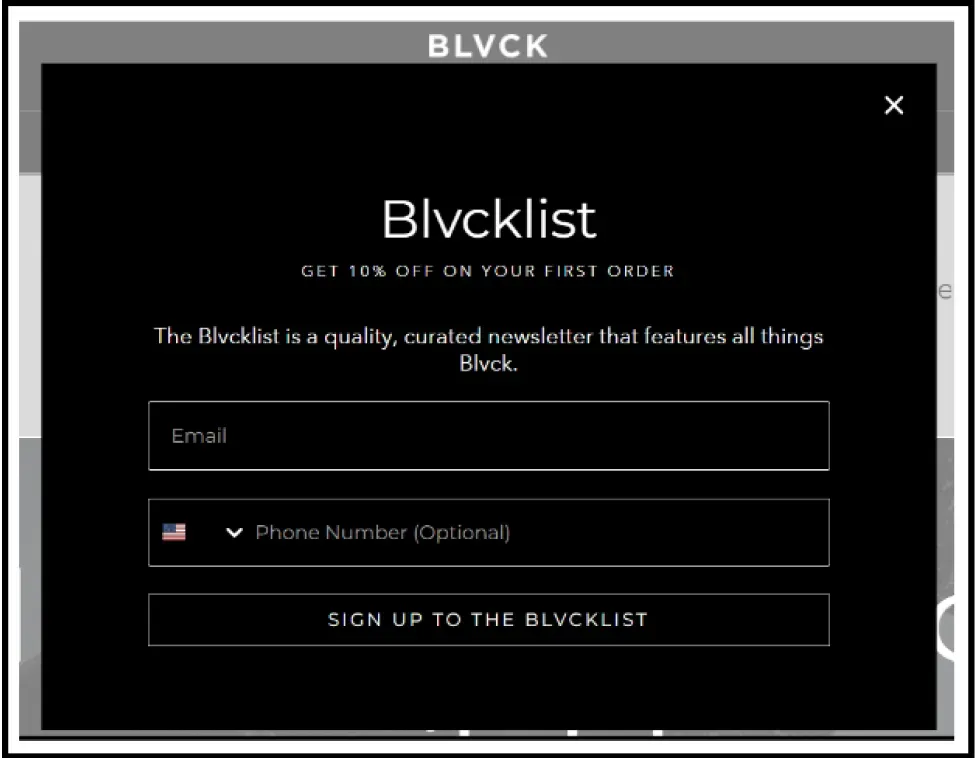
Lifesight helps you create personalized pop-ups that automatically appear at the right time and help you communicate SMS subscription benefits with persuasive pre-built templates.
2) Keyword strategy to give complete control to the customer
With keyword strategy, you make customers opt-in to your SMS marketing, removing the consent barrier. Keep a dedicated number for customers to text, and add their numbers to your SMS list.
Some ways to persuade customers to send that elusive opt-in message is to run contests or provide incentives like instant coupons. But make it clear that texting the keyword gets them added to the SMS subscriber list.
For example, brands can give a $10 discount for the first 100 customers who text the assigned keyword. You can include this offer anywhere – on your app and website, on socials, in an email marketing campaign, or even on the product packaging. Make sure your CTA induces a sense of urgency. Words like “limited time offer”, “exclusive access for first 100 customers”, “instant discounts – 1 day only” work well.
3) QR codes to make the SMS subscription a matter of seconds
Scanning QR codes is quick and hassle-free, and customers are used to it. Though QR codes date back to the 1990s, their usage continues to grow, with 75.8 million U.S. smartphone users scanning a code in just 2021. A billion smartphones are predicted to access a Q.R. code in 2022. Given the ubiquity of Q.R. codes in consumers’ lives, engaging them through one is easy for any brand. A QR code-based SMS subscription strategy simply means that you are making the sign-up process as effortless as possible.
Place a Q.R. code on your website or product package, and ask customers to scan for exclusive deals delivered through text messages. You can also use Q.R. codes on OOH ads in high-footfall spots in the city. For example, let’s say you’re a DTC apparel brand competing with the likes of H&M. You could place an SMS subscription Q.R. code OOH ad in the vicinity of an H&M store promising the first 100 subscribers an instant 30% discount on their first three purchases. The value exchange is as straightforward as it could be. You acquire customers with subscriptions and retain them with ongoing deals and access delivered on SMS.
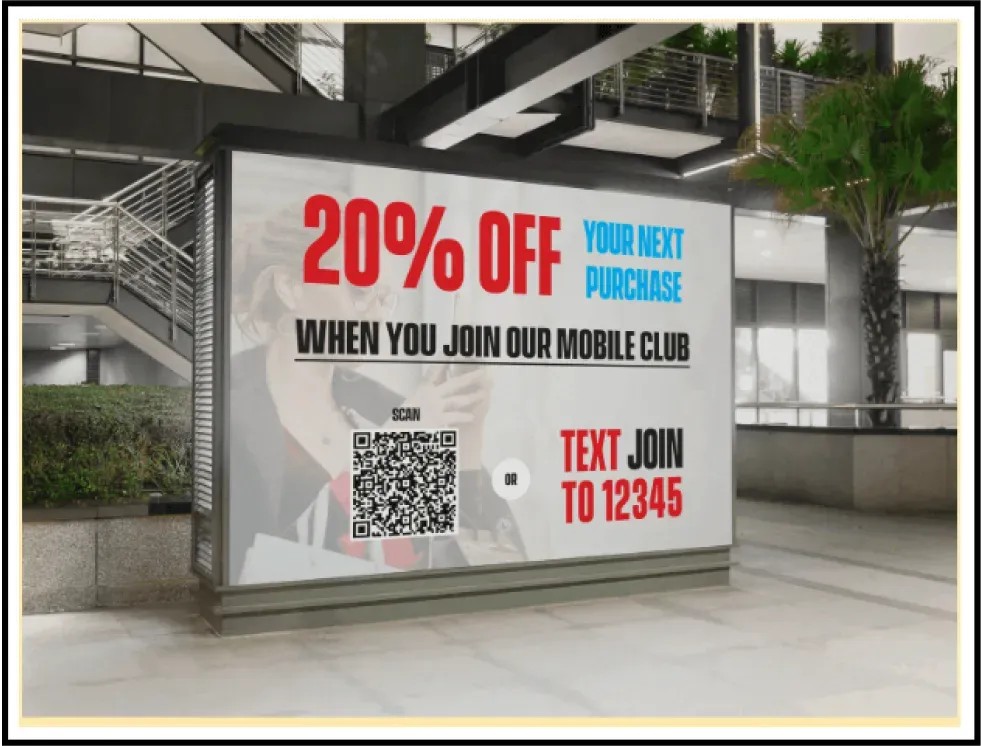
4) Social opt-ins to find SMS subscribers where they spend most of their time
Your customers spend as much as 145 minutes daily on social media. Most brands understand the power of social media in customer acquisition and retention and are predicted to spend a whopping US$226.00bn on social advertising in 2022. But think beyond social ads and consider social opt-ins to build a substantial SMS marketing list. This works exceptionally well if your brand storytelling on social media has been on point and you have garnered a significant following.
Consider social opt-ins as an intermediate step between followers and customers. For example, you can post a link in your stories directing people to SMS subscriptions. You could also use automated Messenger apps asking for opt-in with an offer, promotion, or in exchange for exclusive content. Followers who enter their phone numbers through your social media page are more likely to convert, as they have expressed interest in your brand twice.
For example, you’re a skincare brand and have built a significant following because of your brilliant skincare tips and tricks. Use your social media presence – think Instagram Stories or Facebook Messenger – to acquire SMS subscribers through opt-in in return for even more personalized skincare content.
5) Footer collection to get engaged subscribers
You can utilize the footer space on your website to give information about your SMS subscription program. Website visitors scrolling to the bottom of your website are already interested in your products and may readily subscribe to your SMS list.
Several DTC brands, such as ROKA, an eyewear brand, use website footers to collect phone numbers in exchange for instant updates on new products.
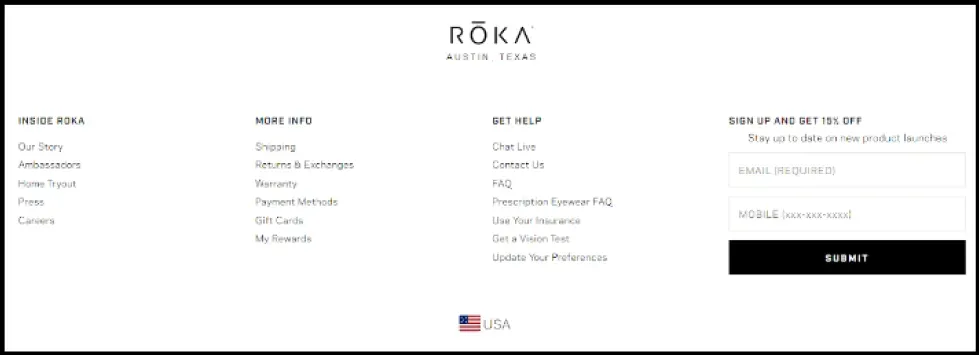
However, this may not be the best answer if your question is how to grow your SMS list. Website footers usually contain miscellaneous information, which means most customers tend to ignore it. To make people subscribe to your SMS list through footers, ensure that the text and creatives are attention-grabbing. We recommend combining the footer strategy with pop-ups.
6) Dedicated landing page for comprehensive information about your SMS subscription programs and benefits
Customers want convenience and comprehensive information to subscribe to SMS marketing lists. For example, if your email subscribers want to sign up for your SMS campaign, then visiting your site and scrolling to the footer might not be the best option. The added steps in the UX might deter customers from subscribing.
Instead, create a dedicated landing page for collecting phone numbers for your SMS list. A simple link or clickable button that takes readers to this landing page will help them understand more about your SMS program quickly, and enter their digits in less than 5 clicks, is an excellent way to go about this.
But there are crucial best practices for this SMS subscription landing page too. Most important of all – you don’t want to waste your customers’ time. So make the subscription process a matter of seconds with persuasive copy right above the field where your customers enter their digits. Other than that, create an engaging landing page experience. Deliver concise information about your SMS program through video or sharp, persuasive copy. Keep the landing page’s look and feel on-brand yet as appealing as possible.
7) Welcome pop-up to grab attention
Welcome pop-ups create the first impression of your site on the customers. Most visitors see the pop-up even before fully seeing your website. Therefore, make your welcome pop-ups attractive and visual, and ensure compelling copy to engage visitors.
If you are using welcome pop-ups to grow your SMS subscriber list, make sure it gives your visitors a great reason to type in their numbers. For example, Hint, a flavored water brand, offers special discounts and updates in exchange for visitors’ numbers. Similarly, you could promise SMS-only codes or freebies in the welcome pop-up to attract more subscriptions.
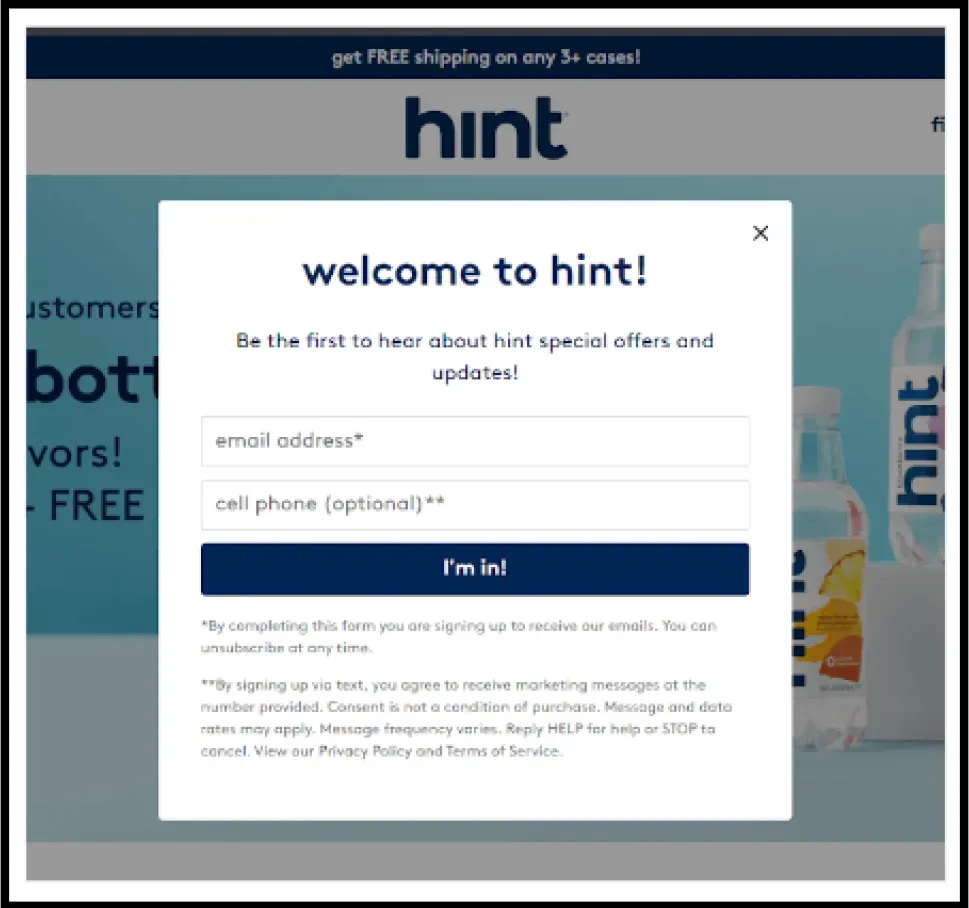
8) Sticky discount box to persuade sale and subscription together
Discount box is a widget-based opt-in that you can add to your product pages. A sticky discount box is a tool you can place just above the “Add to Cart” button, so it’s unmissable.
Customers check this box and enter their phone numbers to join the SMS list. It’s an excellent way to incentivize visitors to buy a product through discounts, coupon codes, or other offers delivered on SMS after they subscribe. You’re closing a sale and gaining a subscriber, all with a tiny widget on your site.
9) Ask for customers’ digits on the checkout page to keep them coming back
Visitors who have reached the checkout page fall in the highly engaged category and are most likely to share their numbers with you. Collecting phone numbers at the checkout page also allows you to send specific text messages depending on their actions. Think abandoned cart texts if they leave without purchasing. Or additional discounts on subsequent purchases for retention if they complete the transaction.
This clever checkout page by Pura Vida Bracelets offers a 20% extra discount on the next purchase if the customers opt-in for SMS updates.
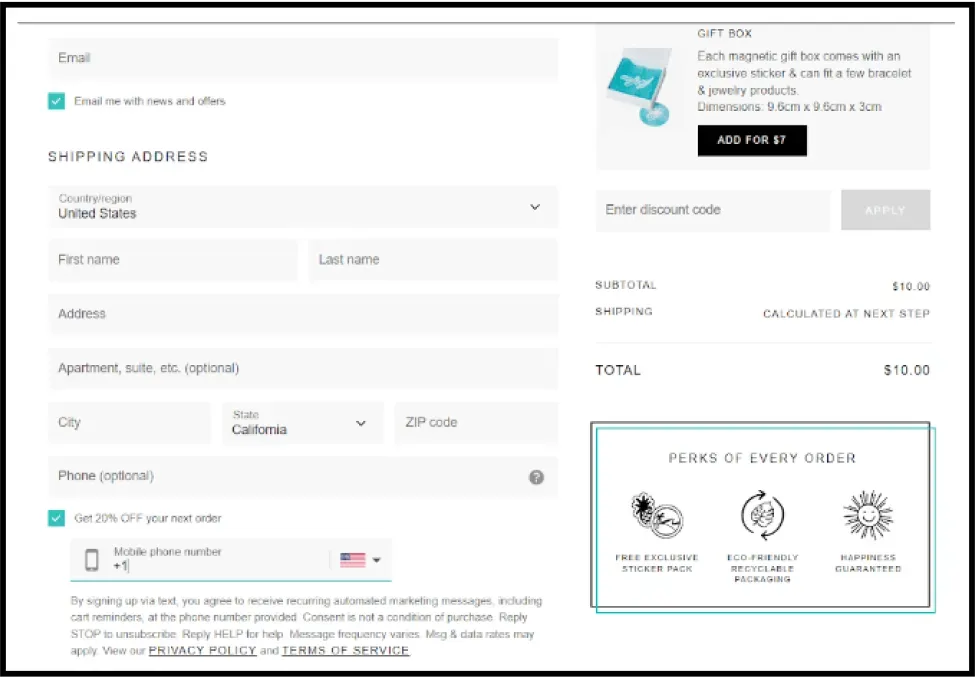
10) Quick and easy automated chat support in exchange for digits
Customers expect quick support from brands with a 1-minute response time leading to a 391% increase in conversions. But this response doesn’t necessarily need to be from a human. Instead, you can utilize AI-based chatbots to automate messages across your social media channels and website.
When customers reach out with queries, the chatbots can quickly respond, ask for phone numbers and consent and solve the customers’ issue – all in a matter of seconds.
Yet another reason why your customers would be willing to share their number is that not all issues can be resolved in seconds, and your chat support might have to get back to them. Sharing a phone number means the customer does not need to hang around until the issue is resolved. Instead, they will be assured of getting a call or text with updates.
But just like all other techniques to grow your SMS subscriber list, value exchange is critical. So make sure your chat copy clarifies why sharing numbers will benefit the customer.
Top tools for SMS marketing
Now that you know why SMS marketing works and how to grow your SMS marketing list, it’s time to dive into the toolkit you need to do it right. Let’s get started.
1) SMSBump
It has the legacy of being one of the first SMS automation tools and is now part of Yotpo. SMSBump and Yotpo collectively offer integrations with major ecommerce sites like Shopify, Bigcommerce, and others.
Through SMSBump, you can personalize SMS campaigns, build SMS flows, and create two-way conversations depending on the receiver’s responses. As one of the oldest SMS marketing platforms, SMSBump has ensured regulatory compliance as it evolved over the years. In addition, the tool allows you to create automated texts to collect SMS subscribers from multiple channels.
SMSBump also analyzes the SMS campaign performance through A/B testing, open rates, and revenue collection.
SMSBump’s pricing is relatively affordable as it offers several flexible packages which accommodate the budgets and requirements of brands of all sizes. However, regular users find that SMSBump is slower in bringing out new features when compared to other SMS marketing tools available in the market now.
2) Recart
Recart was originally a cart abandonment recovery tool that moved to Messenger marketing and is now a leading tool for SMS marketing. After integrating specifically with Shopify, Recart has worked with several brands to generate high ROI and revenue.
With Recart’s SMS marketing automation, you can build lists, create campaigns, and send bulk texts. The tool also automates SMS flows and sends targeted promotions to different subscriber groups.
Recart lets you build SMS flows – either choosing templates from its library or building on your own. Once you set up an SMS marketing flow, it works on autopilot h. Recart can also automate texts across social media channels and grow your subscriber list through welcome pop-ups.
Recart’s unique pricing strategy doesn’t offer prebuilt packages but helps you calculate the expected monthly costs through a tool on its website. You can build a package that suits your requirements and pay only for what you need.
3) Postscript
Postscript is an SMS marketing tool that integrates only with Shopify. However, the tool shows promising results, with a whopping 31x ROI and more than $1 billion in revenue.
It offers multiple options to grow your SMS marketing. From pop-ups and keywords to checkout pages, Postscript has almost every alternative to increase your SMS subscribers while adhering to regulatory compliance.
After building the subscriber list, you can segment them as you like to send targeted promotions and deals to particular groups. Postscript helps you create these groups by analyzing Shopify data, SMS trends, and subscribers’ online behaviors.
You can automate the entire SMS workflow by choosing from over 65 triggers.
Postscript offers its services in monthly packages starting at $100 per month. Not easy on the pocket for new DTC brands, but Postscript does provide exciting features and updates.
4) Attentive
Unlike Recart and Postscript, Attentive integrates with almost all major ecommerce platforms in addition to Shopify. Customers use Attentive to create SMS marketing campaigns for sites hosted on Woocommerce, Bigcommerce, Magento, and others.
The platform offers several features, from SMS list growth techniques to campaign analysis.
Attentive creates engaging experiences beyond traditional texting and includes GIFs, videos, and photographs to keep your leads engaged.
If you want to explore more apps for SMS marketing then read our blog SMS Marketing for Shopify: 11 Apps You Need Now!
Grow your SMS subscribers list and achieve staggering marketing and CX ROI
With high open rates and conversions, SMS marketing is an excellent marketing and CX tool for DTC brands at all levels of growth and funding.
Even if building a subscriber list while maintaining compliance looks difficult, successfully implementing an SMS strategy can do wonders for your revenue. The above strategies are helpful if you need a creative approach to growing and nurturing your SMS subscription list.
Bonus tip: Look no further if you are in the market for a super convenient, built-for-DTC customer data and engagement platform to power high ROI for your SMS marketing. Lifesight is getting ready to help you integrate customer profiles and create high-engagement SMS and omnichannel campaigns to maximize the potential of your data. And it’ll have pre-built templates and unique techniques including all of the above to grow your SMS subscriber list like fire!
You may also like
Essential resources for your success
